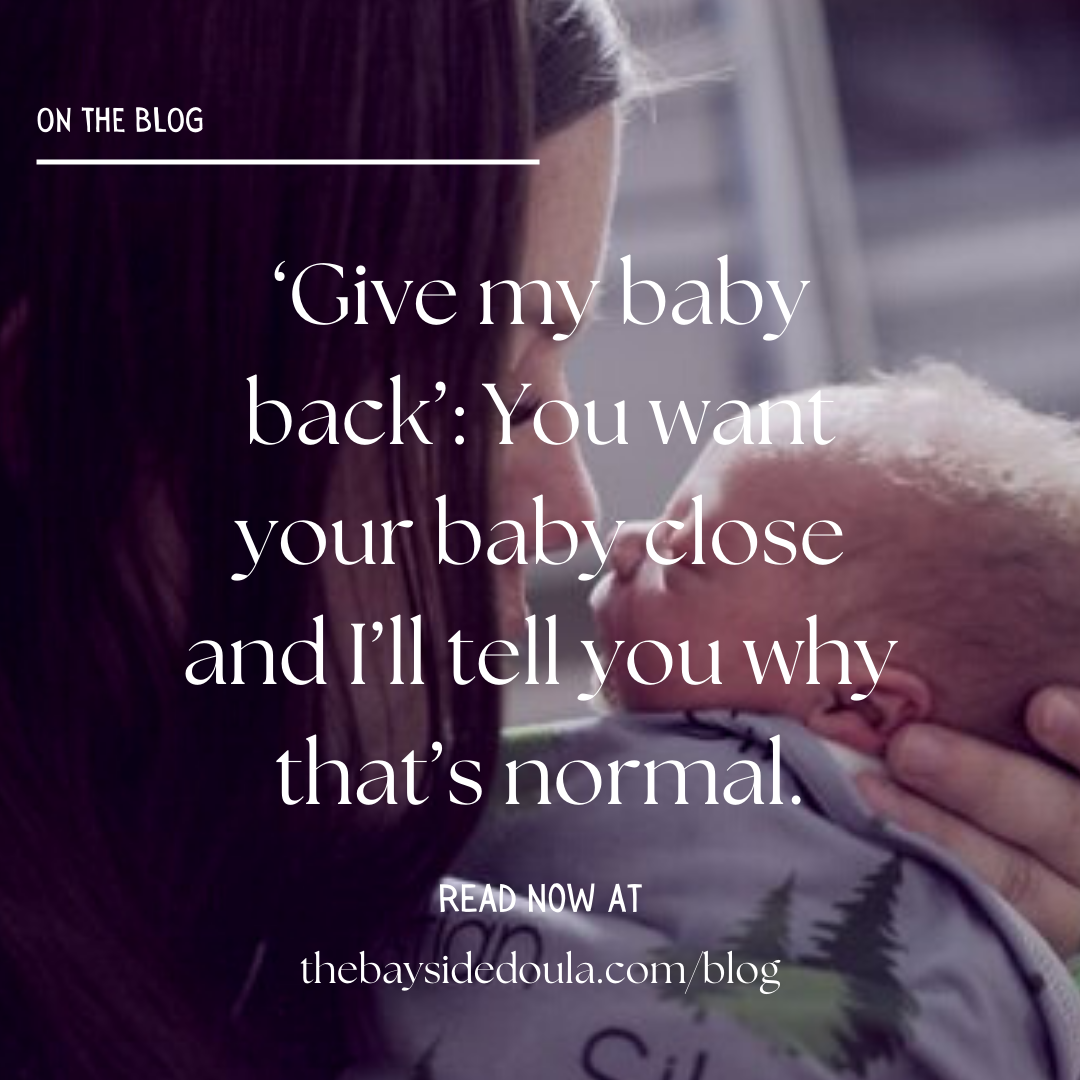‘Give my baby back’: You want your baby close and I’ll tell you why that’s normal.
Picture this: You’re 7 days postpartum, your in-laws are visiting and your mother-in-law is having her first cuddle with the baby. It’s lovely. Your father-in-law takes some photos and you enjoy sharing this bundle of absolute joy with loved ones. Then your baby starts squirming. In response your MIL stands up and starts swaying to soothe him. You want to say “hand him back” but you feel like maybe you’re jumping the gun. Maybe it is better for him to be soothed, rather than handed straight back for a feed? But as baby settles, squirms, and settles again you can’t shake the agitation - almost anxiety - in your body. You miss your baby, you have a yearning for him to be close, even though he’s only a few meters away.
This is normal. Totally, completely, biologically natural. You and baby are meant to be in physical contact, and when you’re not, your hormones are telling you something is not right.
Oxytocin, the love hormone, is so important for bonding between mother and baby (and breastfeeding). Also, oxytocin increases empathy. So you are deeply in tune to your baby’s signals of discomfort or hunger. This is one of the reasons it can feel unbearable to listen to your own baby’s signs of distress. Some studies even suggest that oxytocin may change the way sound signals are processed in the brain - when researchers gave virgin female mice synthetic oxytocin in the lab, these non-mothers started responding to the cries of mice pups, just as the mother mice did, picking them up and putting them back in the nest. It would seem that oxytocin pushes mothers to respond to a baby’s distress. And it wouldn’t be a far leap to suggest that not responding would cause the mother distress too.
Plenty of research has shown that hearing an infant cry activates specific regions in the brain, even milliseconds before we’ve consciously registered the sound. The most obvious are the areas associated with caregiving and empathy. But what I find particularly interesting is that when mothers hear infants cry, brain areas linked to the intention to move, grasp, and speak are also activated. What does this mean? It means we are wired to act when our infants sound distressed.
It explains a lot about why we instinctively want to take our baby back from visitors as soon as we notice even a hint of discontent. And so it’s important that our visitors understand this deep biological connection. And to understand that going against these hormonal and biological urges to comfort our baby, be in physical contact with them, and feed them on demand causes mothers actual distress.
If it feels good for you to free your hands of baby occasionally and enjoy your cuppa then, by all means, do what feels good. But while playing pass the baby is the social norm in our part of the world, no one is going to tell you that you’re being silly. My posts on this kind of thing are for those like me who have strong uncomfortable reactions to being separated from our babies but lack the information and assertiveness to explain why.
Mothers who are returning to a nurture, attachment style of parenting are often seen by older generations as being ‘over the top,’ ‘coddling’ or my favourite, ‘creating a rod for their own backs.’ This is a tough social pressure to push back against and we need all the support we can get - social, scientific, and systemic.
If this is you ⬆️ If you’re struggling to set boundaries and feeling like you’re not in control or that others are judging your decisions about your baby, get in touch. I offer a no-obligations phone chat or we can text/DM. Or if you think you might be ready to receive some hands-on support please click the link below. I’m here for you.
Remember, you are the expert on your baby. Your body knows what you and your baby need. You are the most important person in your baby’s life. It’s time to help mothers know their wisdom and their worth.
1..Marlin, B., Mitre, M., D’amour, J. et al. Oxytocin enables maternal behaviour by balancing cortical inhibition. Nature 520, 499–504 (2015). https://doi.org/10.1038/nature14402
2..Madelon M.E. Riem, M. J. Bakermans-Kranenburg, S et al., (2011) Oxytocin Modulates Amygdala, Insula, and Inferior Frontal Gyrus Responses to Infant Crying: A Randomized Controlled Trial, Biological Psychiatry, Volume 70, Issue 3,Pages 291-297, ISSN 0006-3223, https://doi.org/10.1016/j.biopsych.2011.02.006. (https://www.sciencedirect.com/science/article/pii/S0006322311001399)




